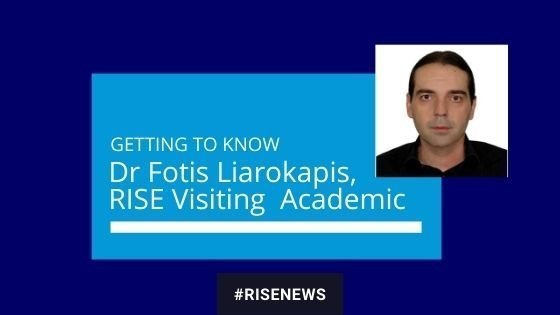How we interact with computers and applications plays an important role in our lives and examples of such interactions can be found in our daily lives. From interacting with cell phones and laptops to interacting with smart devices. What happens though when we utilise emerging technologies to develop novel applications in different areas such as: cultural heritage, health and entertainment?
Dr. Fotis Liarokapis’, RISE Visiting Academic, research interests lie within virtual and augmented reality, serious games as well as advanced human-computer interaction such as brain-computer interfaces. Over the last 20 years he has been developing novel applications in different areas such as those mentioned.
Historic and archaeological sites are an essential part of our cultural heritage and are often difficult to reach for the general public. Regarding my research on digital cultural heritage I have 20 years of previous experience. A characteristic project I worked with was iMareCulture (https://imareculture.eu/). There with my team, I developed a virtual reality realistic simulation of underwater excavations with the aim of educating archaeologists. Within the same project, we developed an innovative underwater augmented reality heritage application that examines the interactions between divers and underwater laptops (tablets/mobile phones). The goal was to provide a unique user experience in underwater environments (https://youtu.be/gNcNkU4aV1I). In another project called Terpsichore (http://terpsichore-project.eu/) we focused on learning side of Folk dances. We first digitized Folklore dances using motion capturing techniques and then created virtual and augmented reality applications for assisting the learning process.
Dr Fotis Liarokapis
What changes do you see on the horizon in your discipline?
The core technologies that I am doing research on such as, virtual and augmented reality are currently booming. Several big companies (i.e. Google, Microsoft, Facebook, etc) are investing a lot of money in them. Apart from numerous experimental applications, we have already seen a lot of commercial products in different application domains. The market projections for virtual and augmented reality is that it will double revenues over the next couple of years.
On the other hand, brain-computer interfaces are more experimental. Currently, I am examining one of the basic techniques of brain-computer communication in which a person mentally imitates a given action (e.g. movement). Through this technique we can interact with various applications, such as games and virtual environments, as well as with robots. We can also help patients recover faster.
Finally, we can interact with different applications, such as language spellings, which are commonly used for people with mobility problems. Brain stimulation can significantly improve training time and efficiency. We expect in the future that brain-computer interfaces will be one of the key technologies in the gaming and creative industries. There are already some companies investing in this field, but it will take more time compared to virtual and augmented reality.
What attracted you to work with RISE?
RISE is a centre of excellence and provides an ideal environment for performing applied research. There is a lot of infrastructure and the centre has many collaborations with high profile external institutions and organisations. Also, the location of the institute provides the possibility of working on areas that are difficult to do elsewhere, for example, I can continue working in underwater augmented reality. Cyprus is a perfect place to do this type of research because it is surrounded by sea and it has a lot of underwater cultural heritage sites.
RISE CoE is committed to support the innovation and economic growth in Cyprus while conducting scientific research in the areas of visual sciences, human factors and design, communication, and artificial intelligence. How would you further this goal?
My research is highly interdisciplinary covering the areas of scientific research that RISE is working on. I have a lot of experience in working with teams of mixed backgrounds as well as in developing novel applications, giving keynotes, organising conferences, and editorials, attracting funding and supervising research students.
My plan is to work closely with RISE researchers to develop new applications and services as well as apply for external funding.
What is your research agenda and how does that benefit RISE?
In the near future, I plan to develop more effective human-computer interaction solutions for healthy users, so that they can interact with computer simulations in virtual and augmented reality applications. Issues of psychology and perception need to be explored in depth considering the individuality of users. The sense of integration into virtual and augmented reality is a powerful case of body illusion, essentially allowing a human to experience the ownership of a modified or completely different body. This is a new challenge as we need to understand the issues and give an embedded experience.
With which RISE Multidisciplinary Research Groups (MRGs) would you collaborate to achieve your research goals?
I am already collaborating with several RISE MRGs with which we have a lot of common ground. In particular, I started working with the “DeepCamera: The next generation of smarter cameras” Research Grpup where we try to work in computer vision tracking for underwater augmented reality environments. I am also extending my previous work with folk dances and I am collaborating with the “Real-time Populated Virtual Environments” and “V-EUPNEA: Living, Breathing Virtual Worlds” Research Groups.
Finally, I recently started a collaboration with the team of the “Virtual Reality for Well-being” Research Group related to brain-computer interfaces and virtual reality. Of course, I look forward to more collaborations within RISE whose interests are similar or could benefit from my expertise.
______________________________________________________________________________
For more information regarding Dr Liarokapis’ work please click here.
Online Webinar: Emerging Virtual and Augmented Reality Environments

